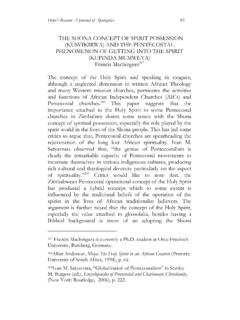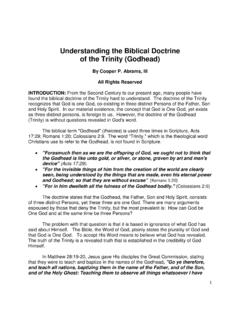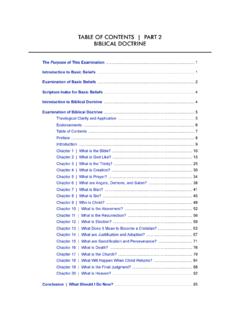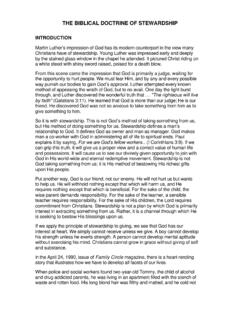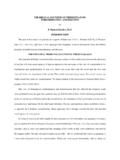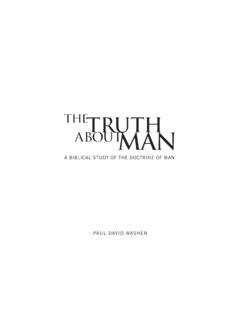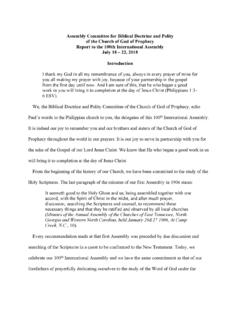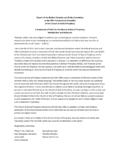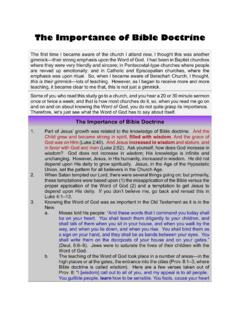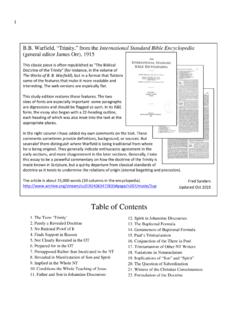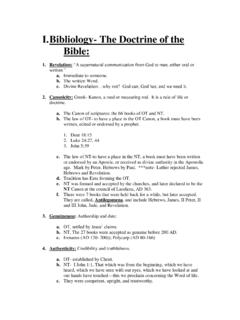Transcription of Word Pro - The Biblical Doctrine of the Wrath of God by Tasker
1 THE Biblical DOCTRINEOF THE Wrath OF GODByR. V. G. Tasker , , of New Testament Exegesis in the University of LondonLONDONTHE TYNDALE PRESSTHE TYNDALE LECTURE IN Biblical THEOLOGY FOR 1951 CONTENTSPREFACE [p. vii]INTRODUCTION [p. 9]THE MANIFESTATION OF THE DIVINE WRATHI. OUTSIDE THE COVENANT [p. 13]II. UNDER THE OLD COVENANT [p. 19]III. IN JESUS CHRIST [p. 27]IV. UNDER THE NEW COVENANT [p. 38]V. THE FINAL DAY OF Wrath [p. 45][p. vii]PREFACEIn this lecture I have endeavoured to draw attention to some of the Biblical evidence,present in both the Old and New Testaments, which reveals God as a God of Wrath aswell as a God of love.
2 It is an axiom of the Bible that there is no incompatibilitybetween these two attributes of the divine nature; and for the most part the greatChristian theologians and preachers of the past have endeavoured to be loyal to bothsides of the divine self-disclosure. In more recent years, however, there has beenwidespread neglect and indeed denial of the Doctrine of the divine Wrath ; andemphasis has been placed almost exclusively upon the love of God revealed in JesusChrist. In consequence the severity of Biblical Christianity has largely been lost sightof, with far-reaching and disastrous results in many spheres of life, as Dr.
3 D. M. LloydJones in his book The Plight of Men and the Power of God has clearly shown. It issurely time that the balance was redressed, and that a generation which has little or nofear of God should be faced with the reality of His Wrath as well as with so-called 'moral' objection to the Doctrine of the divine Wrath has no substancewhen it is realized that the Bible, containing as it does a revelation of God to man,must use the language of the human emotions in speaking of God; but that, justbecause God is God and not man, divine love transcends human love, and divinewrath transcends human Wrath .
4 There is in the love of God none of the fickleness, thewaywardness, and the weakness of human love; and these features are also absentfrom His Wrath . But just as human love is deficient if the element of anger is entirelylacking (for as Lactantius wrote in the third century, 'qui non odit non diligit'), so toois anger an essential element of divine love. God's love is inseparably connected withHis holiness and His justice. He must therefore manifest anger when confronted withsin and Doctrine of the Wrath of God safeguards the essential distinction between Creatorand creature, which sin is ever seeking to minimize or obliterate.
5 Without a realizationof this Wrath we are unlikely to have that 'fear of God which is the beginning of[p. viii]wisdom'. It is with a consciousness of this truth, and with a desire to be faithful to theBiblical revelation as a whole, that I offer this study as a contribution to the series ofTyndale V. G. T.[p. 9]THE Biblical Doctrine OF THE Wrath OF GODINTRODUCTIONOUR investigation into the Biblical Doctrine of the Wrath of God should, I suggest,begin with a careful exegesis of Romans i. 18. In this verse the apostle writes, 'for thewrath of God is revealed from heaven against all ungodliness and unrighteousness ofmen, who hold down the truth in unrighteousness'.
6 1 The main points at issue in theinterpretation of these words are, first, whether the sentence is coordinate with theprevious sentence; and, secondly, what is the exact significance of the present tense 'isrevealed'. On the supposition that the two sentences are coordinate, verse 18 wouldsupply another reason why Paul is 'not ashamed of the gospel'. He is unashamed,because in it a revelation is made not only of the righteousness but also of the Wrath ofGod. In favour of this view, it has been suggested that the form of the two sentencessuggests parallelism; and that, on the assumption that it is in the gospel alone thatGod's Wrath is adequately revealed, there is no contradiction between i.
7 18 and thefurther statement of the apostle in iii. 25 that 'God set forth [Jesus] to be a propitiation,.. because of the passing over of the sins done aforetime, in the forbearance of God'.The revisers were almost certainly right in translating di t n p resin in this verse,'because of the passing over of sins' and not, as the (following the Vulgatepropter remissionem) translated, 'for the remission of sins', 'in order to bring aboutthe remission of sins'; for, although the word p resij is used once in secularliterature for the remission of debts, there is no evidence that it is a synonym for fesij.
8 In the light of the translation of Romans iii. 25, it is accordingly urgedthat in Romans i. 18 also the apostle is saying that before the redemptive activity ofChrist there was no full expression of God's Wrath . In other words the peculiarcharacteristic of the whole pre-Christian era was that God in His forbearance tended tooverlook the transgressions of men, and not to inflict upon them the full punishmentthat they merited. But because He is absolutely righteous such a p resij marthm twn could not be permanent.
9 Sooner or later1 All quotations are from the Revised Version unless otherwise stated.[p. 10]it was inevitable that He should manifest to the full His divine Wrath , particularly asmany were misunderstanding the nature and purpose of His forbearance, and werefondly supposing that He was 'such a one as themselves' (Ps. 1. 21), an easy-goingGod, who would forget their offences and so remit them. Hence it was necessary,'because God had passed over the sins done aforetime', to show His righteousness by'setting forth Jesus to be a propitiation': and it is this truth, so it is alleged, which isalso presented in the apostle's words in i.
10 An interpretation of i. 18 is also said to be consistent with two statements foundin addresses delivered by Paul before pagan audiences; the first at Lystra, in Acts , that God 'in the generations gone by suffered all the nations to walk in their ownways'; and the second at Athens, in Acts xvii. 30, that 'the times of ignorance thereforeGod overlooked'. It is also said to be in accordance with the Septuagint version ofJeremiah xxxi. 32, quoted in Hebrews viii. 9, where God says, 'They continued not inmy covenant, and I disregarded them ( m lhsa a t n)'.

